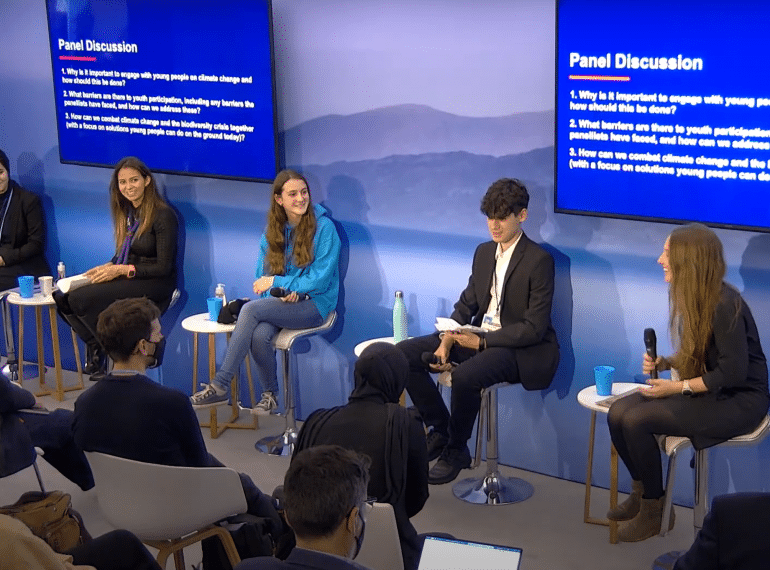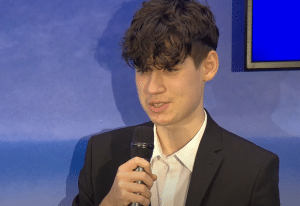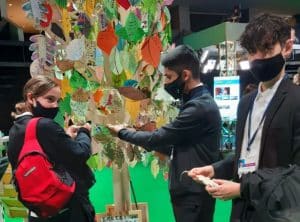
QE COP 26 delegate Toma Gelsinov spoke out about the increasing role that schools are playing in combatting climate change when he appeared as part of a UK Government-backed youth discussion panel in Glasgow.
Toma and his fellow Year 12 pupil, Rahul Doshi, were both invited to take part in the summit to represent the UK Schools Sustainability Network (UKSSN), with Toma heading off to Scotland, while Rahul was part of a home-based remote team.
 “I feel national school campaigns on climate change awareness can be a big factor in the younger generation learning about what impacts they have on the climate and how they can help mitigate and stop climate change,” Toma told other members of the five-strong panel and the assembled audience in Glasgow.
“I feel national school campaigns on climate change awareness can be a big factor in the younger generation learning about what impacts they have on the climate and how they can help mitigate and stop climate change,” Toma told other members of the five-strong panel and the assembled audience in Glasgow.
“Ever since I was young, I have realised how privileged we are in the UK: with the vast amount of resources we have available, if we cannot tackle climate change, who can?”
The panel was supported by the Department for Environment, Food and Rural Affairs and the Department for Culture, Media & Sport.
Now reunited at the School, Toma and Rahul, together with QE’s third Eco Ambassador, Amogh Bhartia, also of Year 12, are looking forward to tomorrow afternoon’s Mock COP26 summit for Years 7-10.
In the panel discussion in Glasgow, during which UK Chief Scout Bear Grylls gave a keynote address, Toma highlighted the work done by UKSSN, including: media appearances and journalism; involvement in local and national politics, and rewilding and gardening projects. All are aimed at combating global warming and the accompanying crisis in biodiversity.
“In my School, we are working to set up an allotment where students can take part in organic composting and gardening,” Toma said. Such initiatives allow pupils to see at first-hand what impact they can have in terms of mitigating climate change, he added.
Twenty students from the network were in Glasgow, with a further 35 participating remotely, including Rahul. He attended online sessions learning about how to communicate effectively with young people about issues like climate finance and climate anxiety.
After his panel meeting, Toma met Education Secretary Nadhim Zahawi and took the opportunity to discuss informally UKSSN’s work and the challenges faced. Toma said afterwards that the Secretary of State was quite knowledgeable and could relate to young people well – going so far as to describe him as a “a cool guy”.
Toma and his colleagues went along to various events at the summit, including a discussion where Mr Zahawi was speaking about the work being done in the education sector to support sustainability.
 Reflecting on his experience after returning to School, Toma said that being at COP 26 with delegates and leaders from around the world was “surreal”, but noted that there were “lots of different people with the same ambitions”. Asked about the prevailing mood, Toma said: “People were secretly optimistic, outwardly expecting the worst, but hoping for the best.”
Reflecting on his experience after returning to School, Toma said that being at COP 26 with delegates and leaders from around the world was “surreal”, but noted that there were “lots of different people with the same ambitions”. Asked about the prevailing mood, Toma said: “People were secretly optimistic, outwardly expecting the worst, but hoping for the best.”
He added: “Together as a team we collaborated and were involved in different events to learn about different perspectives. Lots of the UK team members lived in rural areas and had quite different opinions from those of us from urban areas, based on their lived experiences. The power is in acting collectively: if we act alone it will have less impact. The world will benefit if we come together, sharing good ideas and putting them into practice.”
For his part, Rahul also reported that there was extensive collaboration with other network members – through MS Teams break-outs, for example – with a focus on sharing ideas. “I learned that it is important to collaborate with those with different perspectives and work together. I gained an insight into other people and other schools and what they are doing… understanding different contexts.
“Young people are the future – it is important that they are involved to hold leaders to account for the promises they make. I hope that what we are doing now doesn’t get forgotten – we are pushing for long-term change.”
